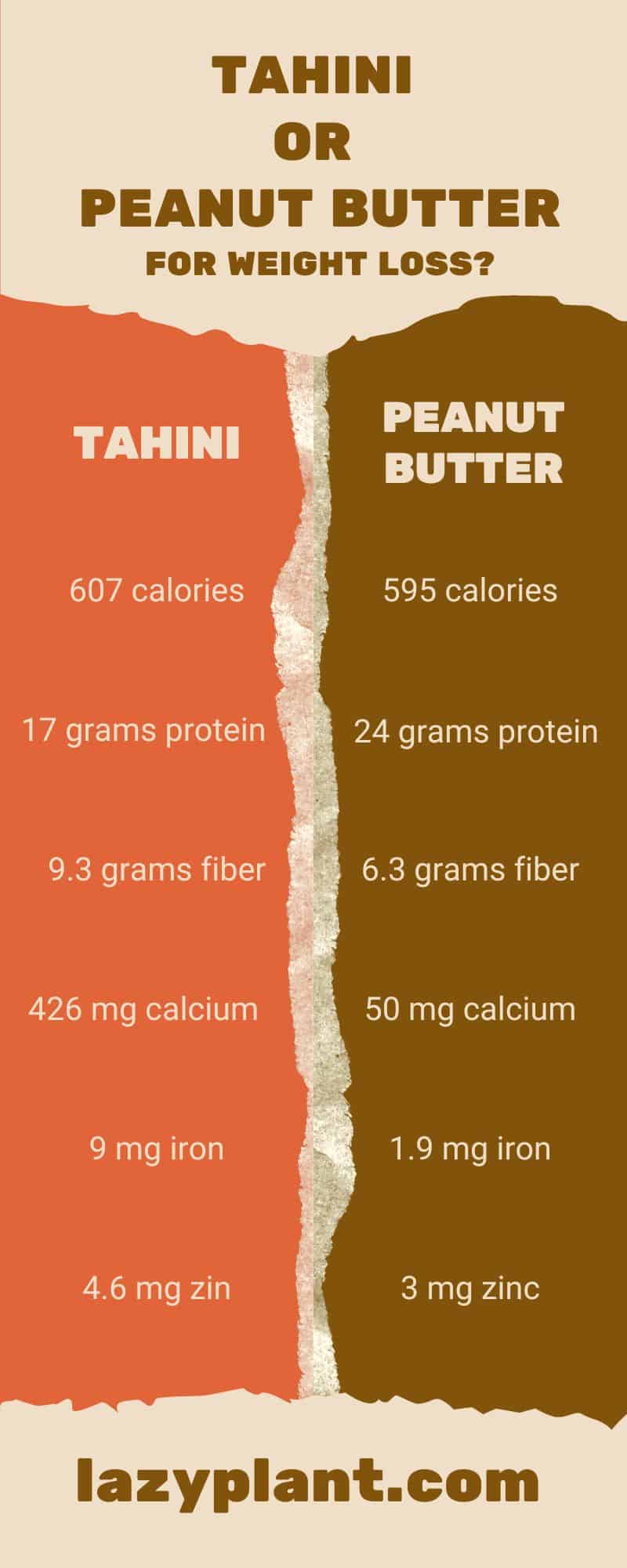Incorporating tahini into meals can enhance the Mediterranean diet’s focus on whole, unprocessed foods, while providing a flavorful, nutrient-dense option for a variety of dishes. Despite its high-calorie content, a tbsp of tahini a day supports weight loss. Eating more than 2 tablespoons of tahini a day could be fattening, though.
Can Tahini be part of the Mediterranean Diet?
Tahini is a traditional Mediterranean spread made from ground sesame seeds, widely used across the Mediterranean and Middle Eastern regions for centuries.
Its origins trace back to ancient Mesopotamia and have been a staple in Mediterranean and Levantine cuisine for thousands of years. The ancient Greeks, Romans, and Egyptians also consumed sesame seeds and likely incorporated them in dishes similar to tahini as well.
Tahini in the Mediterranean Diet
Tahini fits perfectly into the Mediterranean diet because it is made from sesame seeds, a plant-based food rich in healthy fats, particularly unsaturated fats, and a good source of protein, fiber, calcium, iron, and magnesium.
It’s an excellent addition for those focusing on heart health, weight management, and overall wellness. It also provides antioxidants and anti-inflammatory compounds, making it a nutritious, healthy option when consumed in moderation.
Healthy Traditional Recipes Using Tahini
Hummus: Blend tahini with chickpeas, lemon juice, garlic, and olive oil for a classic hummus spread, perfect as a dip or sandwich filling.
Baba Ganoush: Roasted eggplant mixed with tahini, lemon juice, garlic, and olive oil to create a rich, smoky dip.
Tahini Salad Dressing: Combine tahini with lemon juice, garlic, olive oil, and water to make a creamy, nutrient-rich salad dressing.
Tahini Sauce for Vegetables or Grains: Drizzle tahini mixed with lemon juice, garlic, and water over roasted vegetables, quinoa, or grilled meats for a nutritious, Mediterranean-inspired meal.
Nutritional Value
Tahini has 595 calories per 100g. Just 1 tbsp contains about 90 calories! Therefore, people who want to lose weight better limit their daily tahini intake to 1-2 tbsp.
Most calories of tahini come from fat (8 grams per tbsp).
Tahini is keto-friendly and has a glycemic index close to zero. People with diabetes can eat tahini as well.
| 100g | 1 tbsp | |
| calories | 595 | 89 |
| protein (g) | 17 | 2.55 |
| fat (g) | 54 | 8 |
| saturated fatty acids (g) | 7.53 | 1.1 |
| monounsaturated fatty acids (g) | 20.3 | 3 |
| polyunsaturated fatty acids (g) | 23.6 | 3.5 |
| carbs (g) | 21 | 3.2 |
| fiber (g) | 9.3 | 1.4 |
| sugars (g) | 0.5 | 0.07 |
| calcium (mg) | 426 | 64 |
| iron (mg) | 8.95 | 1.34 |
| magnesium (mg) | 95 | 14.2 |
| phosphorus (mg) | 732 | 110 |
| potassium (mg) | 414 | 62 |
| zinc (mg) | 4.6 | 0.7 |
| manganese (mg) | 1.5 | 0.2 |
| selenium (mcg) | 34.4 | 5.2 |
Tahini is a good source of many minerals and compounds that promote weight loss.
Fiber
A tablespoon of tahini provides up to 5% DV. About 90% of tahini is insoluble fiber. Soluble fiber is only 10%.
Most other favorite spreads have less fiber than tahini. For instance, peanut butter has almost 30% less fiber while cashew butter has almost 80% less fiber than tahini. Only almond butter has a similar fiber content to tahini.
Fiber in tahini provides several benefits to gastrointestinal microbiota stimulation. It functions as a prebiotic. Healthy gut microbiota promotes normal digestive function and defenses against pathogens.[2]
Moreover, fiber in tahini promotes satiety. It delays digestion and regulates postprandial glucose responses. Meals high in protein, fiber, and water have the highest satiating effect.[3]
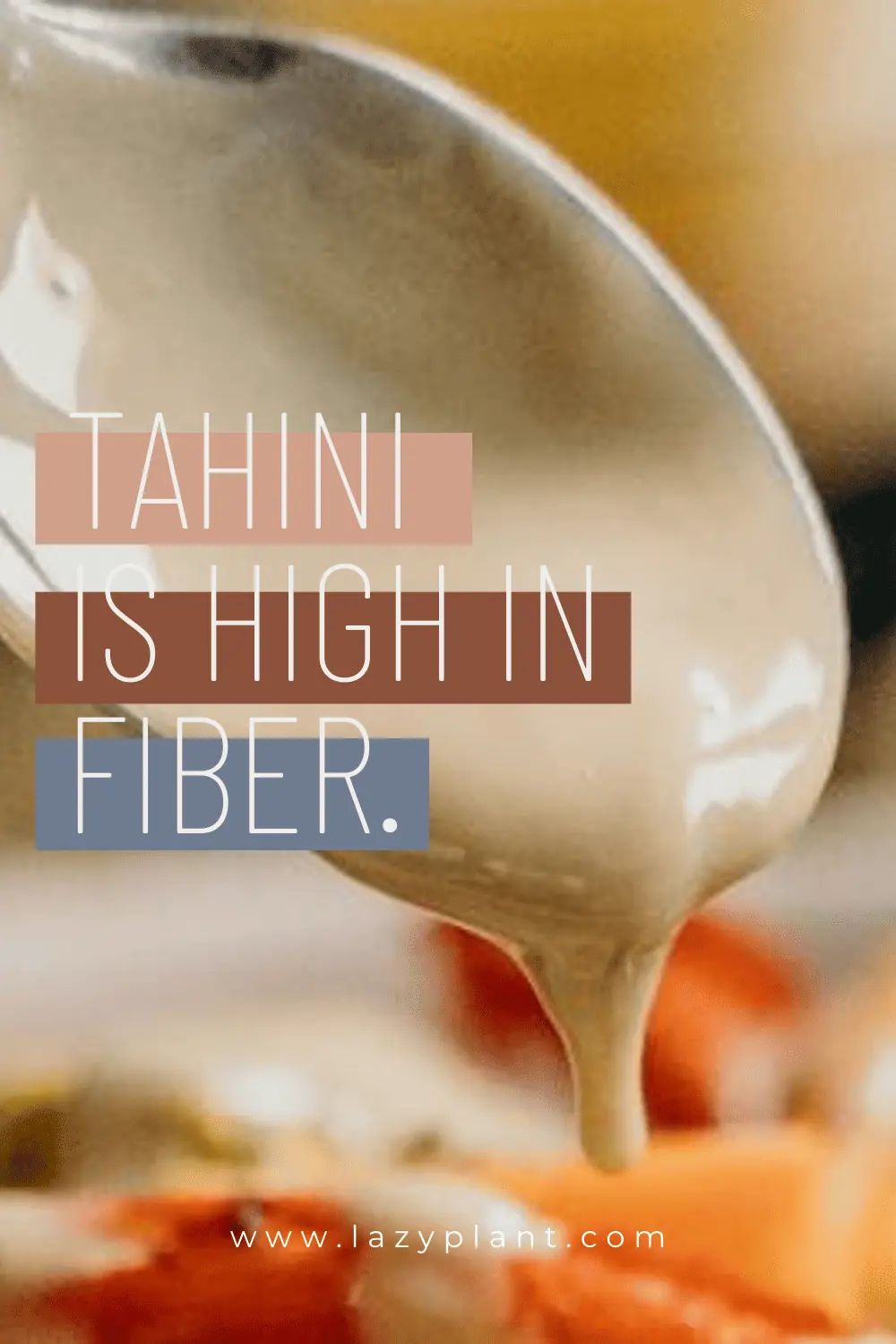
Iron
Tahini provides more than 7% DV per tbsp.
Iron deficiency is the most common nutritional disorder worldwide.[2]
Iron deficiency has been linked to an increased risk of obesity. Lack of iron may cause low energy levels, inactivity, and fatigue. Therefore, overweight people may have a hard time getting active, which is vital for losing weight![3,4]
As only a few plant-based foods are high in iron, people who follow a plant-based diet, like vegetarians or vegans, would benefit from the regular consumption of tahini.
However, the iron content varies greatly among tahini types. The iron content depends on the sesame variety and processing methods. There are tahinis that have less than 6 mg of iron per 100g.
Actually, tahini is one of the best vegan sources of iron. It has significantly more iron than peanut butter, almond butter, cashew butter, or cow’s butter!
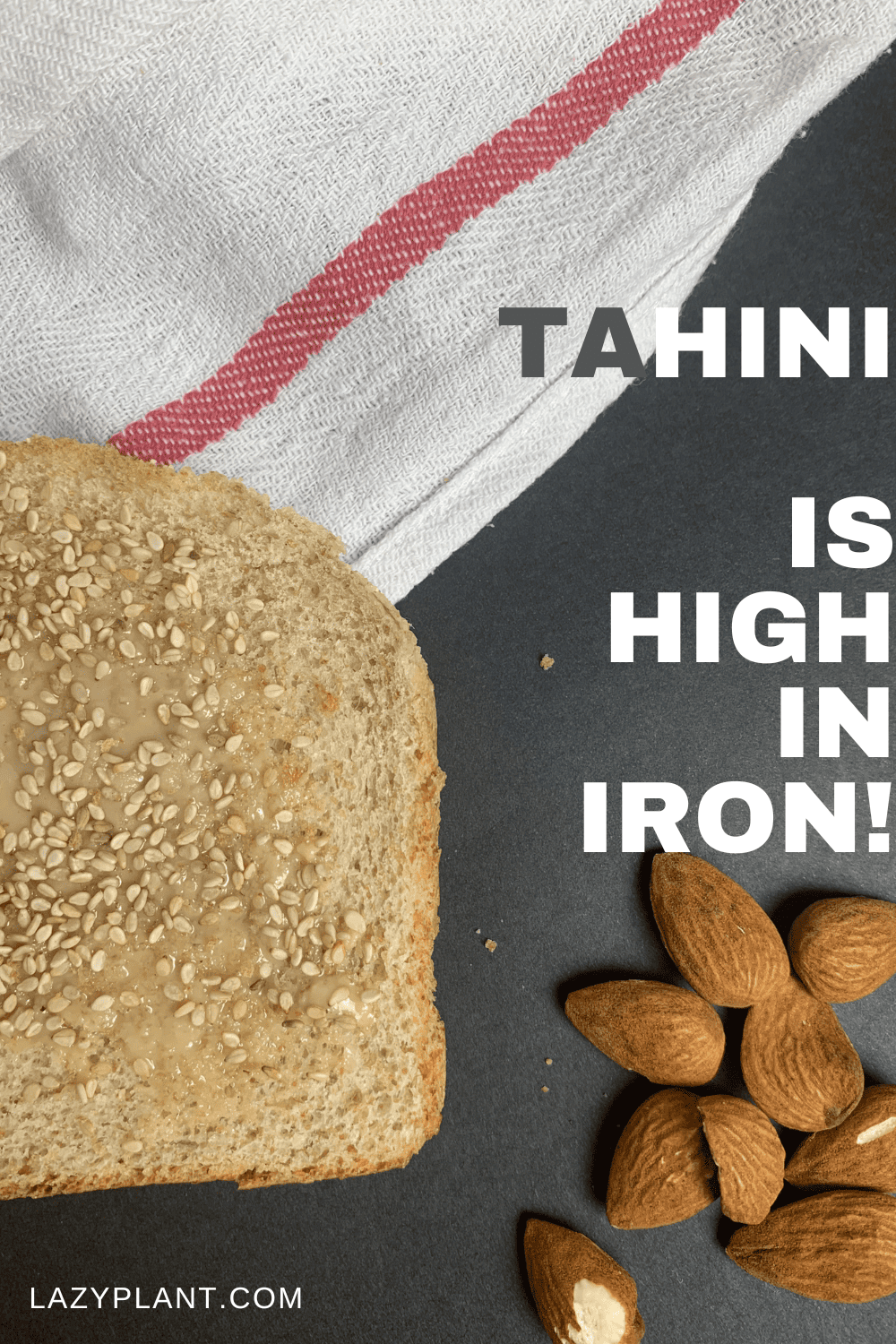
Only a few plant-based foods have more iron than tahini per 100g. Dark chocolate and pumpkin seeds are good examples of plant-based foods with high iron concentrations. The richest vegan foods in iron are beans! A serving can provide more than 50% DV!
As tahinin is non-heme iron (the type found in plant-based foods), it is less easily absorbed by the body compared to the heme iron found in animal products. In order to increase the bioavailability of iron from tahini we could use it in recipes that contain foods high in vitamin C as well as animal-based foods.
You can use garlic in your tahini recipes as well, as it can increase iron bio-accessibility.[5,6]
Calcium
A tablespoon of tahini provides more than 6% DV of calcium! It’s the richest spread in this key mineral. The second-richest common spread in calcium with 5% DV is almond butter. Other common butters are poor sources of calcium.
Calcium plays a key role in weight loss by helping to regulate fat storage and metabolism. Research suggests that adequate calcium intake can help the body burn fat more efficiently, particularly by reducing the amount of fat absorbed by cells.
It also aids in appetite control by promoting feelings of fullness, which may prevent overeating.
Moreover, calcium supports the function of muscle tissue, which is essential for physical activity and maintaining a healthy metabolism. By including calcium-rich foods, such as dairy or plant-based alternatives, you may enhance your weight loss efforts.
| Spread | Calcium (mg) | % DV |
|---|---|---|
| Tahini | 63 mg | 6% |
| Almond Butter | 52 mg | 5% |
| Peanut Butter | 8 mg | <1% |
| Cashew Butter | 6 mg | <1% |
| Chocolate Hazelnut Spread | 16 mg | 2% |
| Cow’s Butter | 6.7 mg | <1% |
| Cottage Cheese | 20 mg | 2% |
| Cream Cheese | 20 mg | 2% |
| Mayonnaise | Negligible | 0% |
| Mustard | Negligible | 0% |
| Ketchup | Negligible | 0% |
Percent Daily Value (% DV) is based on a daily intake of 1,000 mg of calcium.
Calcium Absorption
To maximize calcium absorption from tahini, there are several strategies to keep in mind:
Avoid oxalates: Oxalate-rich foods, such as spinach, collard greens, sweet potatoes, rhubarb, and beans, interfere with calcium absorption. Try to avoid consuming these foods together with tahini to allow more calcium to be absorbed.
Pair with vitamin D: Consuming tahini with foods rich in vitamin D is essential for better calcium absorption. Vitamin D helps the body absorb calcium and maintain appropriate calcium levels in the blood. Foods like fatty fish (salmon, sardines), fortified foods (cereals, orange juice), and eggs are good sources.
Limit caffeine and phosphorus: Excess caffeine and foods high in phosphorus (e.g., processed sodas) can decrease calcium absorption. If you’re aiming to maximize calcium intake from tahini, it’s best to moderate your intake of these.
Calcium-friendly veggies: Pair tahini with non-oxalate, calcium-rich vegetables such as broccoli, kale, cabbage, or bok choy, which allow for better calcium absorption, similar to dairy products.
Moderate phytates: While phytates in grains and legumes can slightly decrease calcium absorption, you can reduce their effects by soaking, fermenting, or cooking grains before consuming them with tahini.
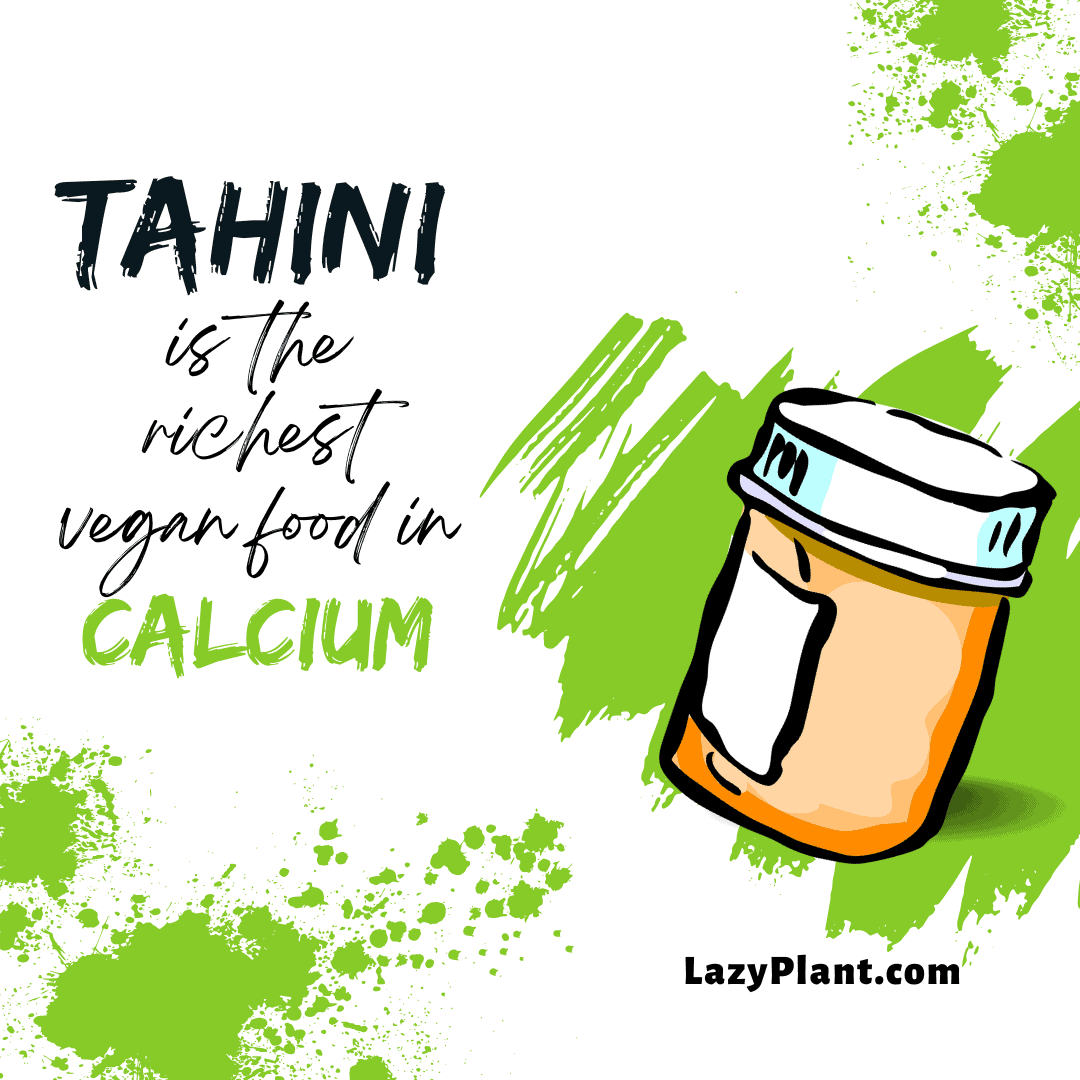
Zinc
Zinc deficiency is another common nutritional deficiency. Many studies have shown that increased zinc intake can help you lose more body weight if you follow a low-calorie diet. Adequate amounts of zinc seem to reduce inflammation, insulin resistance, and appetite in overweight people. Therefore, zinc is important for reducing body mass index (BMI), and waist circumference.[5]
Tahini is a great plant-based source of zinc. A tablespoon provides more than 6% of the DV.
Phosphorus
Above all, tahini and sesame seeds are excellent dietary sources of phosphorus. Adequate daily phosphorus intake is important for maintaining a lean body. Low phosphorus levels have been associated with increased body weight!
Furthermore, adequate amounts of phosphorus can decrease appetite in overweight people. Also, eating foods high in phosphorus may decrease body weight, waist circumference, and body mass index (BMI). So, scientists believe that phosphorus can be a key agent for the prevention of obesity. Moreover, eating foods high in phosphorus may help you lose more weight. Most noteworthy, phosphorus may help lose dangerous belly fat.[6]
Just 1 tbsp of tahini provides 16% of the DV!
Selenium
Tahini is also a great dietary source of selenium. Just 1 tbsp of tahini contains 5.2 mcg of selenium or 9% of the DV.
According to a study with over 3,000 participants, people with high selenium concentrations have the lowest body mass index and percentage of body fat. On the contrary, low selenium levels are strongly associated with obesity.[7]
If you want to lose weight, consume 2-4 Brazil nuts daily. They’re the best dietary source of selenium! Whole cereals are also good dietary sources of selenium.
Antioxidants
Last, but not least, tahini is rich in antioxidants.[8]
Consuming foods rich in antioxidants is good for neutralizing free radicals. High amounts of free radicals can lead to oxidative stress and inflammation, which are common causes of obesity.
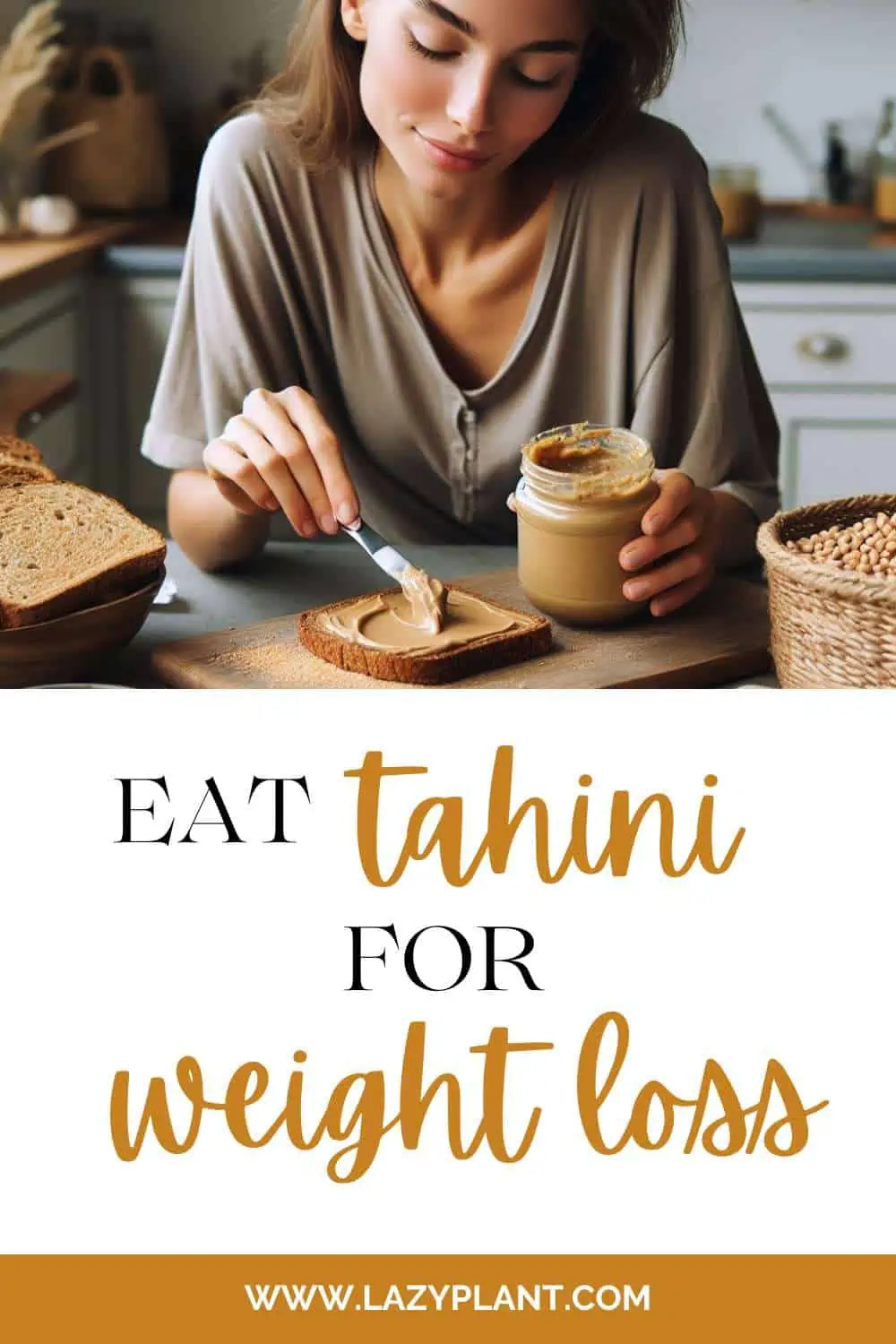
Healthy fats
Moreover, tahini is packed with healthy fats. A tablespoon contains approximately 3 grams of monounsaturated fatty acids and 3.5 grams of polyunsaturated fatty acids. These fats are beneficial for weight loss when consumed in moderation.
Among other benefits, they influence energy metabolism and the burning of body fat.
Researchers found that overweight people burn more body fat when they consume foods with monounsaturated fatty acids instead of foods high in saturated fats.
Protein
Tahini is a good vegan source of protein with approximately 2.5 grams per tbsp.
Tahini has a great amino acid profile as compared to other plant-based foods. It’s high in sulfur amino acids and is an excellent dietary source of leucine and tryptophan. However, tahini isn’t a complete protein. It has low amounts of certain amino acids, such as isoleucine, valine, and lysine.[2]
Protein in tahini is highly bioavailable, with a protein digestibility score of over 83%.
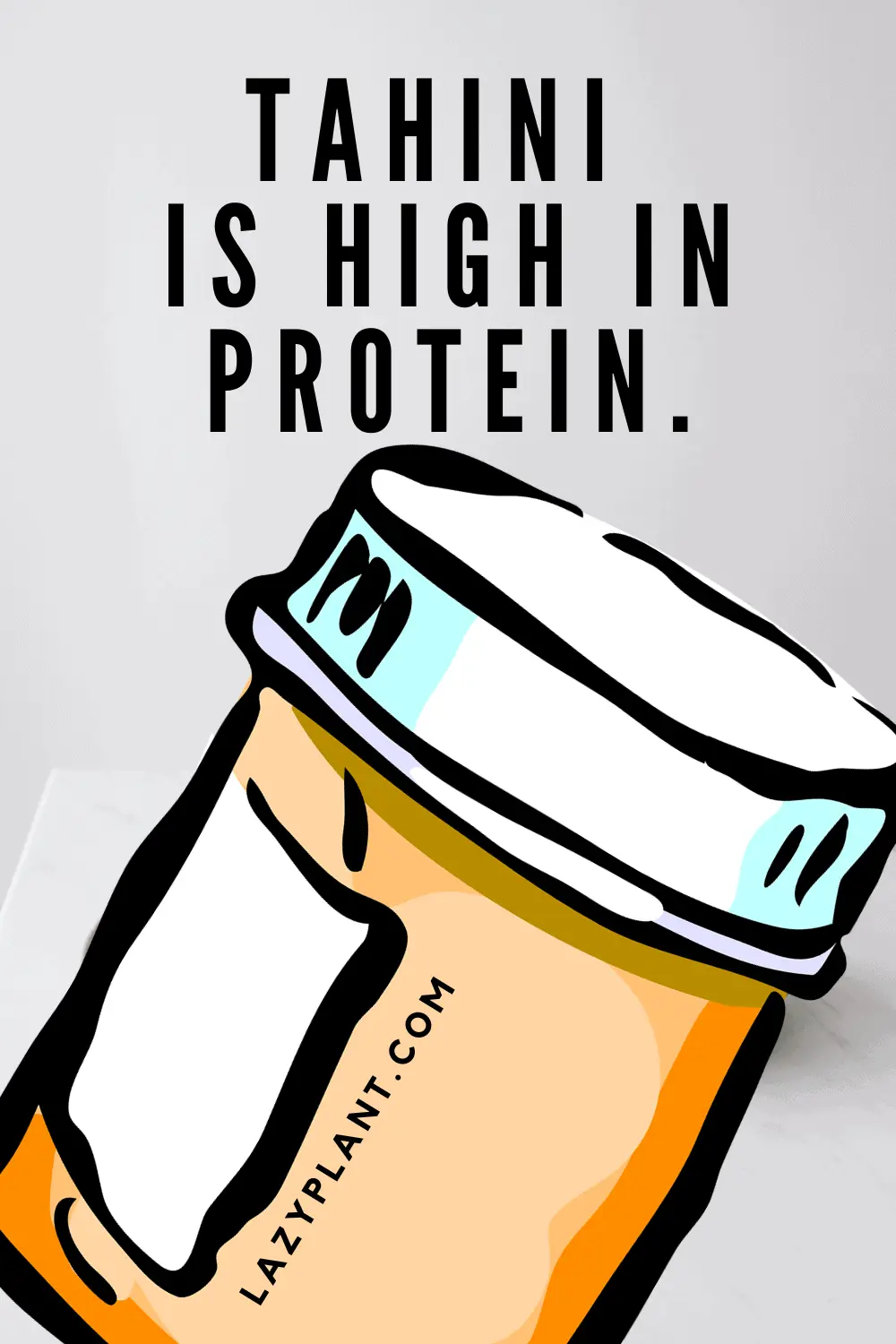
Do other spreads have more protein?
Other favorite spreads have more protein than tahini. The richest common spread in protein is peanut butter with 3.6 grams of protein per tablespoon. Almond butter has 3.1 grams of protein per tablespoon while cashew butter has a similar protein content to tahini 17 grams per 100g).
Other common spreads, such as mayonnaise, ketchup, or mustard have negligible amounts of protein.
Mediterranean Protein-rich Recipes
Here are some Mediterranean protein-rich recipes and snacks with tahini to help boost your protein intake:
Tahini Hummus: Blend chickpeas, tahini, olive oil, lemon juice, garlic, and seasonings until smooth. Serve with whole grain pita or veggies for a protein-packed snack.
Tahini Greek Yogurt Bowl: This is a perfect high-protein breakfast or snack. Mix tahini and honey into Greek yogurt, and top with fresh fruits and chia seeds.
Tahini and Lentil Salad: Lentils are protein-packed, and combined with tahini dressing, this makes a nutritious Mediterranean dish. Toss lentils with a tahini-lemon dressing, garlic, olive oil, parsley, and seasoning.
Tahini Quinoa Bowl: Quinoa is a complete protein, and tahini adds creaminess and flavor. Mix cooked quinoa with roasted vegetables, drizzle with a tahini-lemon dressing, and sprinkle with sunflower seeds.
Tahini Tofu Wrap: A plant-based, protein-rich wrap perfect for lunch. Spread tahini on the wrap, add grilled tofu, fresh veggies, and herbs, and drizzle with lemon juice.
Tahini Protein Smoothie: Blend all ingredients (1 banana, 1 tbsp tahini, 1/2 cup Greek yogurt, 1/2 cup almond milk, 1 tbsp chia seeds or protein powder) until smooth. This smoothie is packed with protein from tahini, yogurt, and chia seeds.
Falafel with Tahini Sauce: Falafel is a protein-rich dish made from chickpeas and traditionally served with tahini sauce. Blend falafel ingredients and form patties. Fry or bake until golden. Serve with a tahini sauce on the side.
- Ingredients for Falafel: 1 can chickpeas (15 oz, drained), 1 small onion (chopped), 1 garlic clove (minced), 2 tbsp flour, 1 tsp cumin, 1 tsp coriander, fresh parsley
- Tahini Sauce: 2 tbsp tahini, 2 tbsp lemon juice, 1 garlic clove (minced), water to thin
Tahini has about 17 grams of protein per 100g.
How much can I Eat?
Certainly, tahini can make you gain weight, as it’s pretty high in calories. You should limit your daily tahini intake to 1–2 tablespoons a day if you follow a sedentary life and want to lose weight.
Only active people, fitness enthusiasts, or athletes can consume more. In fact, tahini has many benefits for athletes. It can greatly improve athletic performance!
Is Tahini Fattening?
Furthermore, the way you incorporate tahini into your daily eating routine can play a crucial role in weight management.
While tahini is a nutritious food, consuming it in excess or pairing it with calorie-dense foods can contribute to weight gain.
Using tahini in recipes with high-calorie additions, such as sweeteners or large amounts of oil, can increase the overall calorie content of the dish.
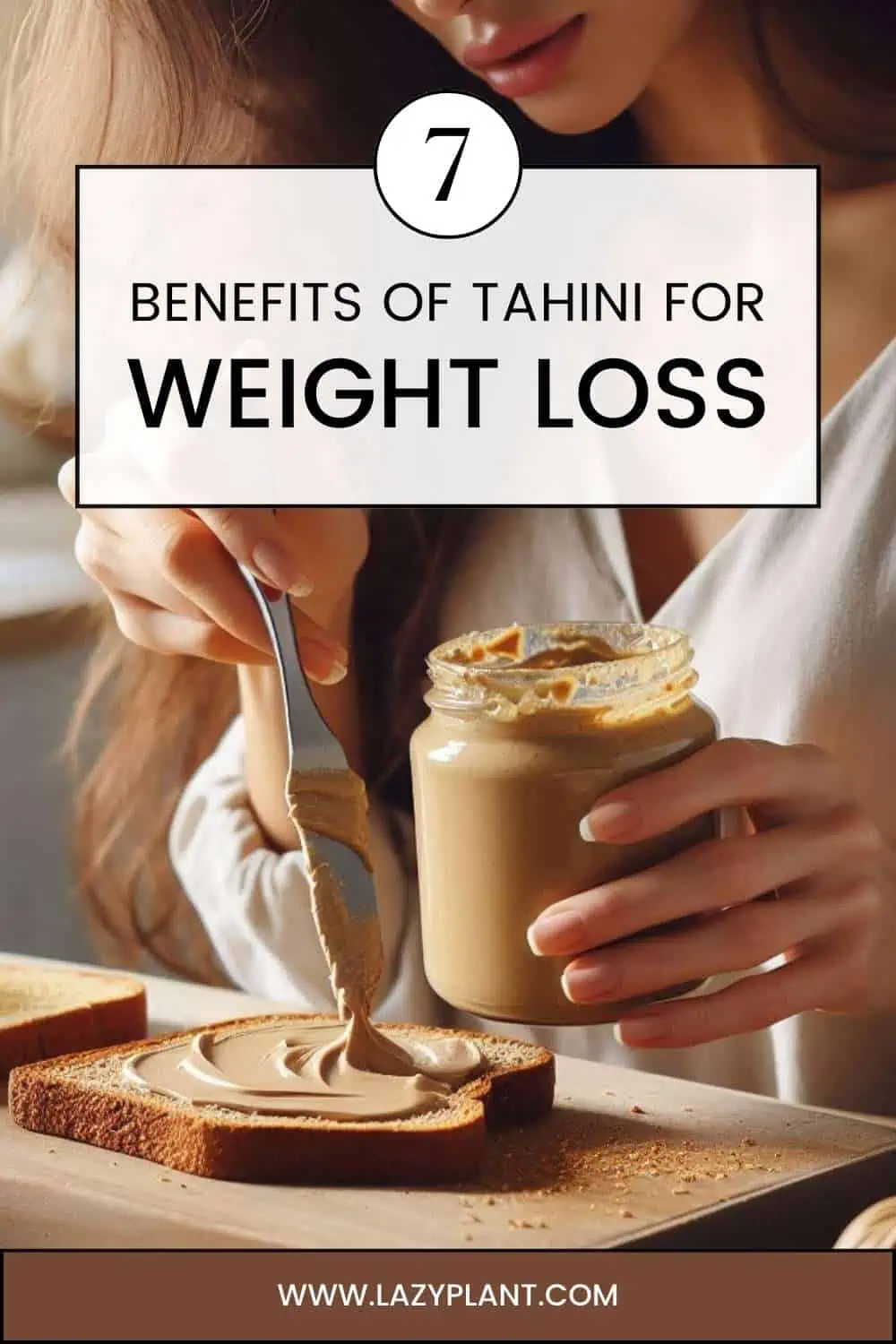
Regularly snacking on tahini without considering portion sizes or overall calorie intake can lead to an excess of calories as well.
Relying heavily on tahini without incorporating a variety of other nutrient-dense foods may result in an unbalanced diet, potentially contributing to weight gain. We should eat tahini with plenty of other healthy foods.
Keep in mind that some commercially available tahini products may contain added sugars, preservatives, or unhealthy fats, contributing to an increase in calories and potential weight gain.
Can become Dangerous?
Tahini can pose some risks if not consumed in moderation. While it is packed with healthy fats, it also contains saturated fat—about 9% of the daily value per tablespoon. The American Heart Association advises limiting saturated fat intake to 13 grams a day for a 2,000-calorie diet, so consuming too much tahini, especially alongside animal-derived products, could increase your intake beyond safe levels.
Additionally, tahini is calorie-dense and could contribute to weight gain if consumed excessively, even for athletes.
People with allergies should also be cautious when trying tahini for the first time.
What’s the Best Time to eat Tahini for Weight Loss?
There isn’t a specific “best” time to eat tahini for weight loss, as weight management is more about overall dietary patterns and calorie balance.
At Breakfast
However, it’s a good idea to consume tahini at breakfast. Firstly, we can consume tahini on an empty stomach. It won’t spike blood sugar levels. Moreover, tahini provides steady levels of energy and keeps you full for hours.
As a Snack
Also, incorporating tahini into a balanced snack can help curb hunger between meals. Spread it on whole-grain toast or pair it with fruits or vegetables.
In addition, adding tahini to meals, like drizzling it over salads or using it as a dressing, can enhance flavor and satisfaction, potentially reducing the likelihood of overeating.
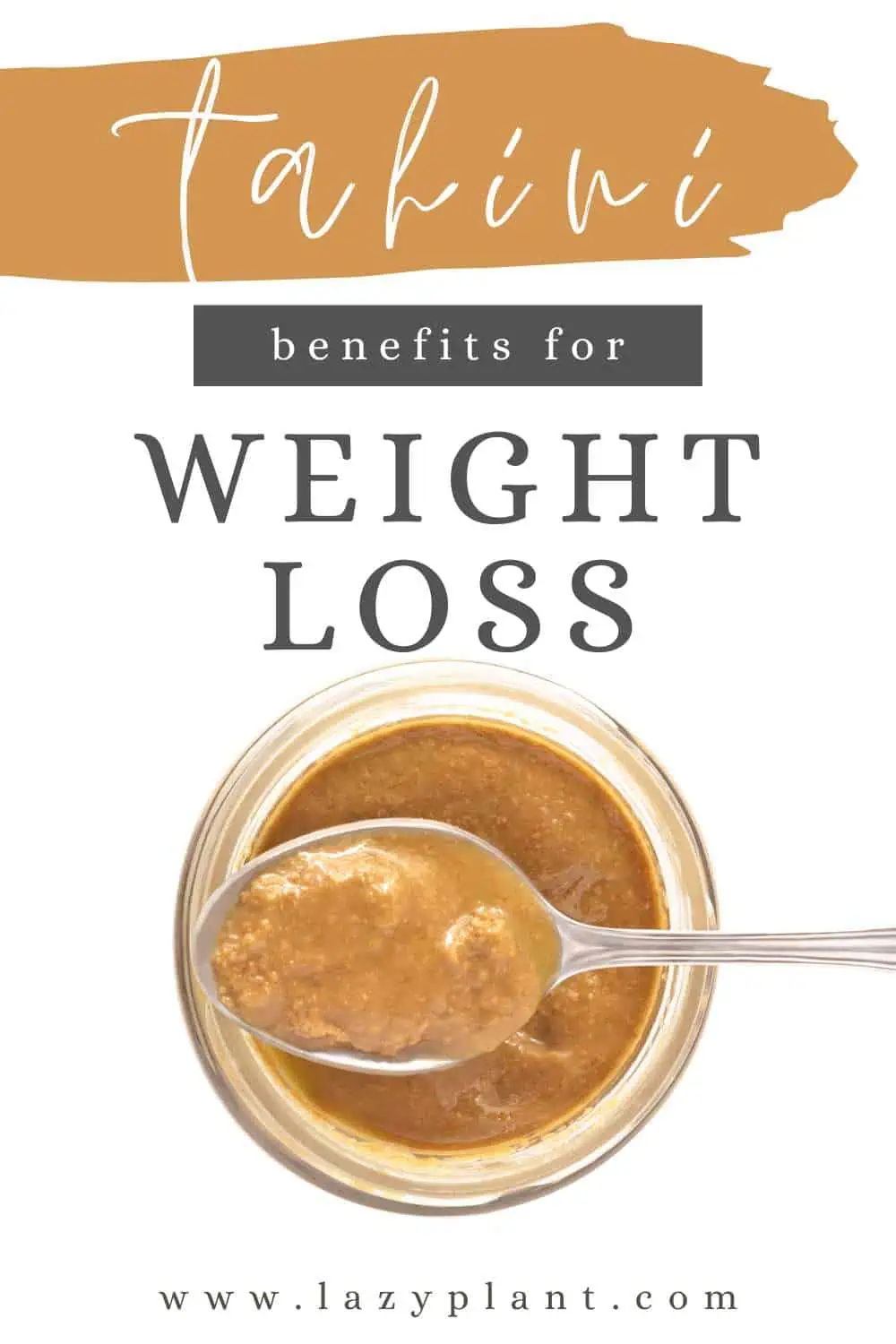
After Exercise
Tahini, made from ground sesame seeds, is a nutrient-dense powerhouse that can significantly aid in post-exercise recovery, muscle gain, and weight loss. Here’s why incorporating tahini into your post-workout routine can benefit your body composition and overall health:
Muscle Mass and Protein
Tahini is a rich vegan protein source (2.6 grams per tablespoon). After exercise, your muscles need protein to repair and grow, making tahini an excellent addition to your diet for muscle hypertrophy. The protein content helps replenish muscle fibers, promoting recovery and growth.
Monounsaturated Fats and Testosterone
Tahini is packed with heart-healthy monounsaturated fats. These fats not only help raise beneficial HDL cholesterol but also play a role in synthesizing key hormones like testosterone, which is vital for muscle growth and fat loss, as well as vitamin D.[2]
Replacing saturated fats with monounsaturated fats can boost energy expenditure, reduce body fat percentage, and improve insulin sensitivity.[3,4]
Electrolyte Balance and Hydration
Post-exercise hydration is critical, and tahini helps replenish essential electrolytes lost through sweat. It’s rich in calcium, magnesium, and potassium—key electrolytes that support muscle function, prevent cramps, and maintain hydration.
Bone Health and Vegan Calcium Source
Athletes lose significant amounts of calcium during intense workouts. Tahini, as one of the richest non-dairy sources of calcium, supports strong bones and counteracts the acidity of animal protein, which can weaken bones over time.[6]
A calcium-rich diet also supports testosterone production.
Cholesterol and Heart Health
The lignans in tahini have been shown to lower LDL cholesterol and reduce the risk of heart disease. For athletes who consume large amounts of meat and dairy, which are high in saturated fats, tahini is a heart-healthy alternative. This is crucial for maintaining long-term health while pursuing strength and fitness goals.[7,8]
Antioxidants and Recovery
Tahini is rich in antioxidants that combat oxidative stress and fatigue from strenuous exercise. By neutralizing free radicals, these antioxidants help improve recovery and reduce the risk of muscle injuries.
Just a tablespoon provides about 9% DV of selenium which is necessary for the synthesis of one of the most potent antioxidant enzymes, called glutathione peroxidase. Selenium is a key element for improved athletic performance and reduced training recovery time.[11]

Vital Minerals
Tahini is an excellent source of minerals like zinc and iron. Zinc supports muscle synthesis and recovery, while iron is essential for oxygen transport and energy production during exercise. Tahini helps replenish these vital nutrients, especially important for female athletes and those at risk of deficiency.
Copper (27% DV) in tahini stimulates the synthesis of collagen and connective tissue! Almost two-thirds of the body’s copper is located in the skeleton and the muscles.[12]
Moreover, copper supports the production of red blood cells, which transport oxygen and improve blood flow to the working muscles.[13]
Phosphorus (16% DV) in tahini is also essential for strong bones. When combined with resistance training, phosphorus can increase bone mass and strength.
When should an Athlete Eat Tahini?
For the best results, consume tahini within a couple of hours after your workout. This allows your body to maximize its recovery benefits without risking digestive discomfort. Avoid eating tahini right before a workout, as the fiber content may cause bloating or stomach discomfort during intense exercise.
Tahini: the Vegan Superfood
Tahini’s combination of essential nutrients, healthy fats, protein, and antioxidants makes it an excellent food choice for vegans. Its richness in calcium, iron, magnesium, and trace minerals addresses common nutrient gaps in a plant-based diet, supporting overall health and wellness. Including tahini in meals can enhance nutrient intake and contribute to a balanced and nutritious vegan diet.
Among others, it contains various B vitamins, including niacin (5% DV), which is important for energy metabolism, and thiamine (15% DV), essential for nerve function and energy production. Calcium, copper, and zinc are also hard to find in plant-based foods.
How to Eat Tahini for Weight Loss?
You can only eat a slice of whole grain bread with a tbsp of tahini. More can be fattening.
Moreover, you can add tahini as a key ingredient to many food recipes, dips, and dressings. Here are 12 easy and quick tahini recipes that can be incorporated into a weight-loss diet:
Protein-rich dishes
- Tahini and Greek Yogurt Dip: Mix tahini with Greek yogurt, lemon juice, and herbs like dill or parsley.
- Tahini and Baked Chicken: Marinate chicken breasts in a mixture of tahini, garlic, lemon juice, and herbs. Bake until cooked through.
Vegan Recipes
- Tahini and Avocado Toast: Spread tahini on whole grain toast and top it with mashed avocado, a squeeze of lemon juice, and a sprinkle of salt and pepper. Avocado supports weight loss as well.
- Tahini and Quinoa Bowl: Combine cooked quinoa, steamed vegetables, and a drizzle of tahini sauce for a balanced and satisfying meal.
- Tahini and Grilled Eggplant: Grill eggplant slices. Serve them with a drizzle of tahini sauce, lemon juice, and a sprinkle of fresh herbs.
- Tahini and Baked Falafel: Blend chickpeas, herbs, and spices to make falafel patties. Bake them in the oven. Serve with a side of tahini sauce.
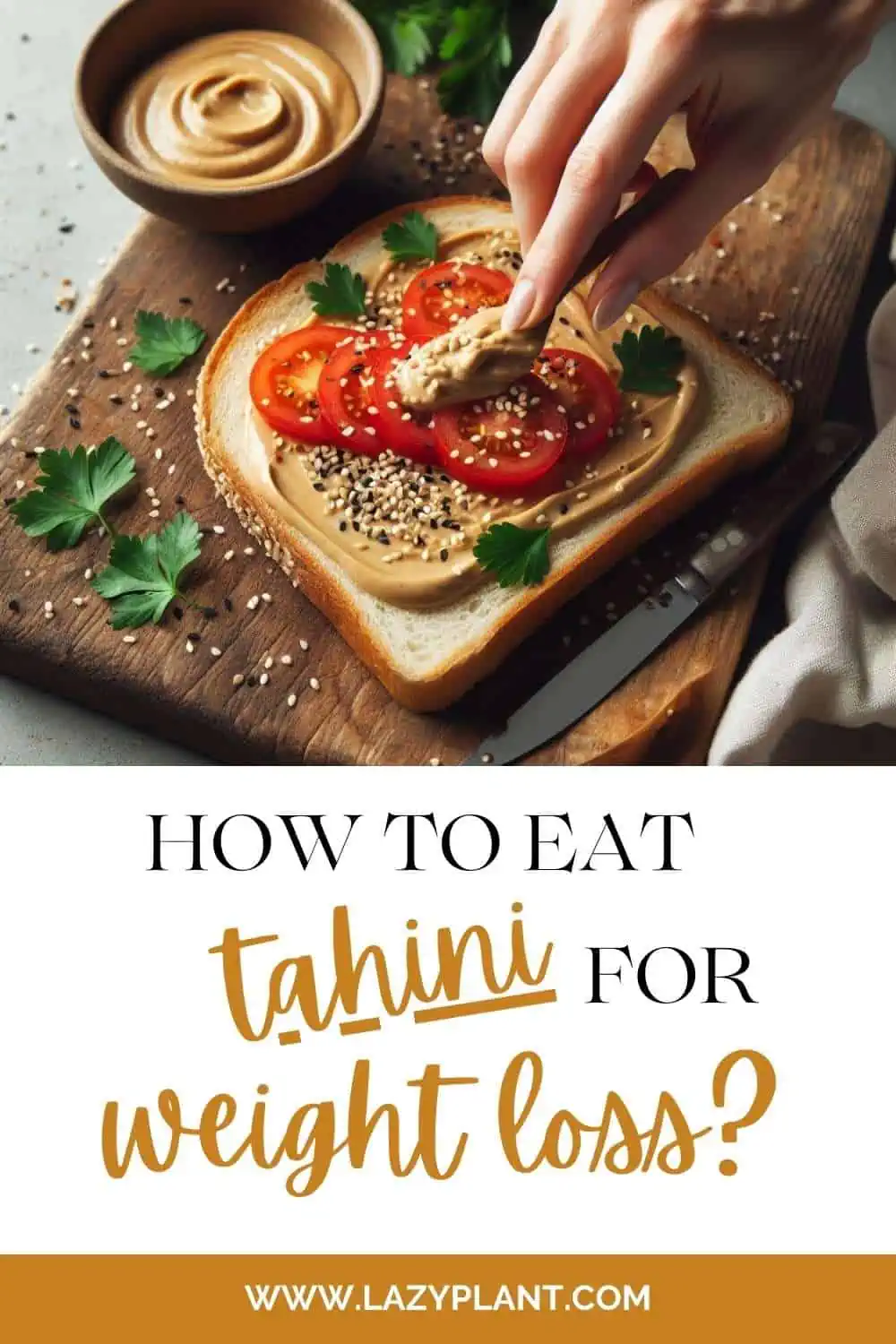
- Tahini and Lentil Salad: Combine cooked lentils, diced tomatoes, cucumbers, red onions, and parsley. Then dress it with a tahini-based dressing and lemon juice.
- Tahini and Stuffed Bell Peppers: Stuff bell peppers with a mixture of cooked quinoa, chickpeas, and tahini. Then bake until the peppers are tender.
- Tahini and Oat Energy Balls: Mix tahini, oats, dates, and a sprinkle of cinnamon to form small energy balls. They can be enjoyed as a healthy snack.
- Tahini and Fruit Smoothie: Blend tahini with frozen berries, banana, almond milk, and a dash of honey for a nutritious, rejuvenating, and filling smoothie.
- Tahini and Roasted Cauliflower: Coat cauliflower florets with a mixture of tahini, olive oil, lemon juice, and spices like cumin and paprika. Roast until golden brown.
- Tahini and Vegetable Salad: Toss mixed vegetables like cucumbers, bell peppers, cherry tomatoes, and lettuce with a dressing made of tahini, lemon juice, and garlic.
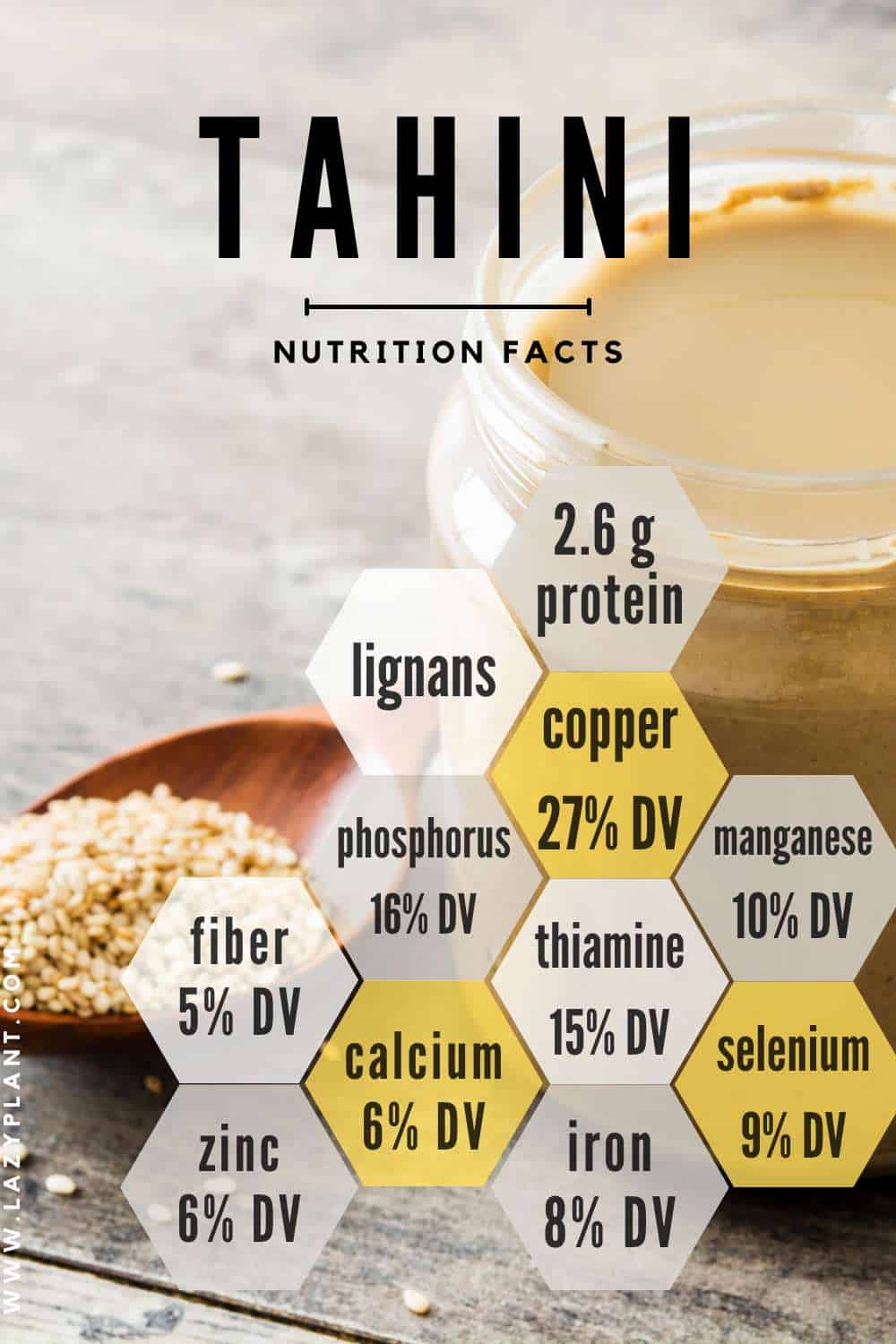
Tahini vs Peanut Butter
While both tahini and peanut butter can be part of the Mediterranean Diet and a weight loss plan, tahini may be the healthier choice due to its superior calcium, iron, and fiber content, as well as its lower caloric density.
However, peanut butter is a good source of protein and magnesium.
The choice between the two can depend on individual dietary preferences and nutritional needs, but incorporating either in moderation can be beneficial for weight management.
| Nutrient | Tahini | Peanut Butter |
|---|---|---|
| Calories | 89 calories | 95 calories |
| Protein | 2.6 g | 3.6 g |
| Fiber | 1.4 g (5% DV) | 0.95 g (3% DV) |
| Calcium | 65 mg (6% DV) | 8 mg (<1% DV) |
| Iron | 1.34 mg (7% DV) | 0.28 mg (1% DV) |
| Zinc | 0.7 mg (6% DV) | 0.46 mg (4% DV) |
| Magnesium | 3% DV | 7% DV |
| Phosphorus | 16% DV | 8% DV |
| Copper | 27% DV | 9% DV |
| Manganese | 10% DV | 11% DV |
| Healthy Fats | 3 g (mostly monounsaturated) | 4 g (mostly monounsaturated) |
